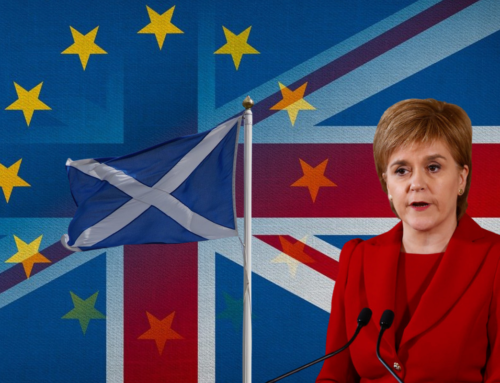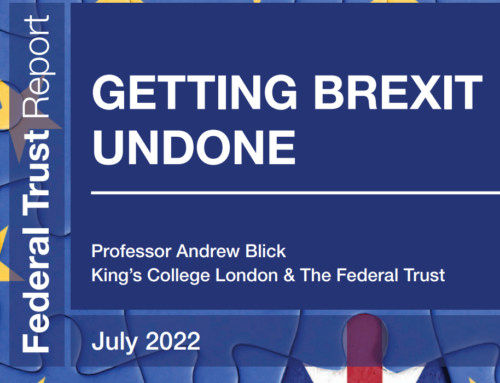by Baroness Quin, House of Lords; Council Member of the Federal Trust
4th August 2015
This article first appeared on the European Movement website.
One of the biggest myths about the circumstances in which Britain joined the EEC (as it was then) in 1972 was that what we were being offered was simply a trading arrangement which did not involve pooling or loss of sovereignty. Those propagating this myth therefore claim repeatedly that the British people were sold a dishonest prospectus about what European membership involved.
Nigel Farage for example is on record as saying: “my parents’ generation voted to remain a part of a Common Market which they believed to be a free-trade arrangement that would not impinge on our rights of self-government. We were conned in 1975 and we must not allow that to be repeated today.”
The foreign secretary Philip Hammond said in opening the debate on the European referendum bill in the House of Commons “ like millions of others I believed then that I was voting for an Economic Community that would bring significant economic benefits to Britain but without undermining our national sovereignty. I do not remember anyone saying anything about ever-closer union or a single currency.”
Such claims are contrary to the facts and there are plenty of historical documents and records which prove they are not true. In any case it is wrong to equate a “Common Market” with a “Free Trade Area”. Britain was already part of a Free Trade Area before 1972 (EFTA) and the EEC or “Common Market” was seen as a more ambitious and very different alternative. A free trade area involves merely reducing tariffs on goods traded between the participants and removing import quotas. A common market such as the EEC involved the free movement of goods, capital, people and services. It meant the establishment of common rules and the creation of a court and judicial proceedings to safeguard the rules that had been agreed by the member states.
The ambitions of the EEC were clearly spelt out both in the treaty of Rome and the treaties setting up the European Coal and Steel community and EURATOM and these treaties were public documents and widely commented on at the time of the referendum – and indeed for many years previously.
To give just a few examples: Conservative prime minister Harold Macmillan way back in 1962 in a pamphlet published under the title “Britain, the Commonwealth and Europe” wrote “accession to the treaty of Rome would not involve a one-sided surrender of sovereignty on our part but a pooling of sovereignty by all concerned, mainly in economic and social fields. In renouncing some of our sovereignty we would receive in return a share of the sovereignty renounced by other members.”
In the same year the Labour Party National Executive issued a public statement which read: “the Labour party, however, is also aware that membership of the common market would involve commitments…. which, in their scope and depth, go far beyond our relationships with any other group of nations. For the central purpose of the common market is not just the removal of trade barriers between its member states but the conscious merging of their separate national economies into a single unit.” The same Labour Party statement also made it clear that in the common market “common policies, arrived at by majority decisions, will emerge.”
Prime Minister Edward Heath in 1972 signed a public EEC communique which read “the member states of the Community, the driving wheels of European construction declare their intention of converting their entire relationship into a European union before the end of the decade”.
In the immediate run-up to the referendum in December 1974 the EEC heads of government agreed to another communique which talked of economic and monetary union as “being basic to the establishment of Community solidarity” and “importance must be given to combating inflation and unemployment, and to drawing up common energy and research policies and a genuine regional and social policy for the Community”. Ambitious ideas indeed and although the Werner plan to create economic and monetary union by 1980 via the “snake in the tunnel” initiative linking European currencies failed, monetary union and other common policies were certainly issues much discussed at the time.
The key Europe debate in the House of Commons was that held in October 1971 which was the debate on whether or not to accept the terms negotiated for EEC entry by Edward Heath’s government. The debate lasted 6 days with over 200 speakers and no one who reads that debate today can be in any doubt that EEC membership involved much more than being part of a free trade area. Arguments raged over sovereignty and over common policies already in existence and those which might be developed in future. At the end of the debate the Prime Minister Edward Heath said; “it is right that there should have been so much discussion about sovereignty.”
As was expected at the time the EEC did evolve over the years. For example an issue which was seldom mentioned at the time of Britain’s entry was the environment. However given the concerns about pollution and climate change and the fact that such things do not respect national boundaries Europe was bound to respond to the environmental challenge. But most would argue that EU environmental policies have been beneficial and necessary and recognise that the EU has been proactive in pushing for international environmental agreements.
The idea of “ever-closer union” is of course part of the preamble to the treaty of Rome. However what has been clear over the years since that was signed is that in practice – and contrary to claims that the EU is some kind of dictatorship which overrides its member states – considerable flexibility has been introduced into the rules which have been agreed. For example not all countries decided to join the euro. Denmark, Sweden and Britain, of those able to join, chose to continue with their national currencies. In the area of justice and home affairs, Britain, along with Denmark and Ireland has an opt-out. Prime Minister John Major also negotiated an opt-out from the social chapter of the Maastricht treaty in 1992 although this was a controversial decision in Britain which the Blair government subsequently overturned.
In recent treaties more emphasis has been given to the principle of “subsidiarity” meaning that decisions should be taken at the lowest appropriate level, as close to the citizen as possible. Provisions have also been made to strengthen the role of national parliaments within European decision-making processes.
In conclusion then it is true that the European Union has changed over the years – it would be surprising if, particularly in response to events, it had not. However it has not always changed in a centralising direction despite the creation of new policy areas. Even the creation of the single market itself is not complete although Britain has been amongst the keenest of countries to see this achieved. It is clear, too that national identities, understandably, are still very much a part of the EU of the 28 countries of today. Indeed given that the enlargement of the EU has brought in countries which were formerly under the Soviet yoke it would be astonishing if those countries, having regained their freedom and independence and having become functioning democracies, simply wanted to be dominated by another centralising force – this time in Brussels!
However what is clear from all the evidence is that what we voted for in 1975 was not just a trading arrangement and if we are to have an informed debate in the forthcoming referendum we must base our arguments on the historical facts surrounding Britain’s EU membership not myths.






